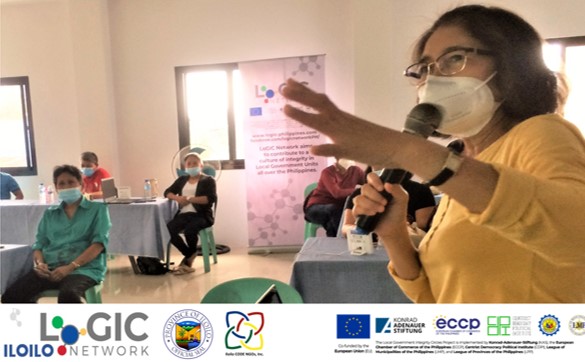The 30 municipalities in Iloilo Province with a Multi-Sector Integrity Circles in place under the Local Government Integrity Circles (LoGIC) Project are now “digital ready” for engagement under the new normal after completing the digitization package, a one-day training on the use of online tools and platforms aimed for effective monitoring of Integrity Mechanisms.
The Multi-Sector Integrity Circles actors who completed the training were municipal-based civil society organizations, private business, and the Local Government Unit (LGU), mostly represented by the Local Economic and Investment Promotions Office (LEIPO).
The digitization package (digipack) was designed for Iloilo Integrity Circles by the Iloilo Caucus Development NGOs Network (Iloilo CODE-NGOs) and the Local Economic Development and Investment Promotions (LEDIP) Center of the Iloilo Provincial Government as directed by Iloilo Governor Arthur Defensor, Jr.
Governor Defensor, Jr. has issued Executive Order No. 039, Series of 2020 which reorganized and reconstituted the Integrity Circle of the Province of Iloilo.
The digipack was rolled out in 5 clustered districts where the 30 municipalities are located between September 7 to 16, 2020.
The training completion served as the highlight of months long preparations and series of pre-training activities that were held both online and offline.
Tailored digipack for Integrity Circles network
The digipack is a compressed set of capacity building tools for effective online work under the new normal. It is composed of soft and technical orientation, step-by-step tutorial, trial run, and actual exercises.
The participants was able to learn the basic technical aspect of starting online work like installation of wi-fi router, resetting of wi-fi router, downloading of applications, and synchronization of mobile devices such as laptop computers and smart phones, among others.
It also enabled participants to get a refresher through a tutorial on how to set-up an E-mail account using Gmail, its interlinking usage like Google Drive, Google Map, and its meetings platform like Google Meet and also Zoom, the most popular application these days used for webinars, meetings and conferences.

The resource persons also reintroduced Facebook and the Facebook Page by presenting the many features that were integrated with the app and which participants can utilize for their livelihood activities, enterprises, or to simply establish the presence of their organizations online through social media.
The effectiveness of using the Facebook Page to reach out to producers and consumers or on how to connect them was illustrated using the Iloilo Wholesale Tindahan, an application developed because of the pandemic, so that participants can relate visually how the online system works.
Likewise, the participants was able to apply their skills through a trial run on the use of Zoom, Google Meet and Messenger Room with role play exercises in organizing a meeting, hosting a meeting, and being a webinar participant.
Another important learning was the use of digital wallets like GCash and PayMaya, a facility that most community-based CSOs were not familiar before the training.
Multiple benefits of digipack training
The digipack’s content was designed with elements that combined basic knowledge and technical skills to impart a blended capacity to participants in preparation for online work.
Its development underwent thorough deliberation from LEDIP, Iloilo CODE-NGOs, and independent technical experts who conducted the trainors’ training last September 4. It also underscored practical tips for ease of use and troubleshooting considering the target beneficiaries of the digipack.
Its design was likewise envisioned to deliver multiple benefits to participants.
First, to enhance their online ability to monitor the Integrity Mechanisms established by CSO-LGU-LoGIC Network’s partnership at the municipal level; second, to develop capacity to transition to online work which they can also apply on their respective organizations; and, lastly, to foster personal advancement by increasing their competency as development workers under the new normal.
All of the participants across 30 municipalities were highly appreciative of the effort calling the initiative relevant and necessary for it responded on their needs. They were also committed to practice the knowledge and skills that they have acquired from the training and to share it within their respective sectors and organizations.
The LoGIC Project is a 3-year initiative which carry the noble objective of establishing a culture of integrity in LGUs all over the Philippines through the institutionalization of the LoGIC Network.
The project is co-funded by the European Union and by the German Federal Ministry for Economic Development Cooperation.
It is implemented in the Philippines by the Konrad-Adenauer-Stiftung Philippines together with the European Chamber of Commerce of the Philippines (ECCP), Centrist Democracy Political Institute (CDPI), League of Provinces of the Philippines (LPP), and League of Municipalities of the Philippines (LMP).